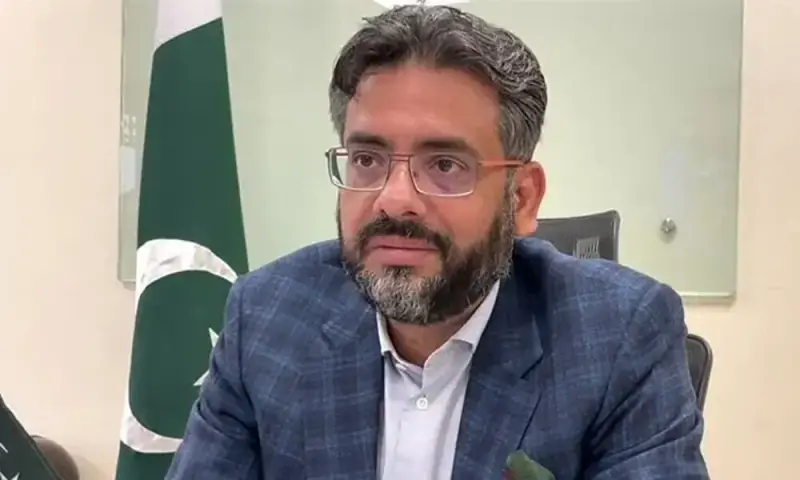ISLAMABAD: Muzzammil Aslam, Adviser to the Chief Minister of Khyber Pakhtunkhwa on Finance, sharply criticised the federal government, accusing it of financial dishonesty and reckless mismanagement in its handling of the country’s Rs14,131 billion in tax revenue, warning such actions have exacerbated fiscal imbalances and undermined provincial autonomy.
Speaking at a news conference here on Wednesday, Aslam vehemently pointed out that while the provinces receive just 57 percent of national revenue, the federal government unapologetically retains 42.5 percent, alongside a staggering Rs5,141 billion in non-tax revenue – a sum it hoards entirely for itself, further tipping the scales in its favour and deepening fiscal inequities.
He also emphasised that the true fiscal picture is far more distorted, with the federal government holding an even larger share of national revenue, including all non-tax revenues, which upends the fiscal balance to the detriment of provincial governments.
According to Aslam, this revenue should be distributed according to the National Finance Commission (NFC) Award, but instead, it remains wholly under the control of the federal government.
The result, he added, is a growing disparity between the centre and the provinces, with the federal government essentially hoarding funds that should be equitably shared.
“Out of Rs14 trillion in national revenue, the centre retains over Rs5 trillion in non-tax revenue, and still claims entitlement to 41.5% of the total revenue,” he remarked. “This is not just misleading, it is dishonest. The figures they are presenting to the public are intentionally deceptive.”
Further deepening his concerns, Aslam condemned the federal government’s management of development funding. Despite a projected national expenditure of Rs17,593 billion for the current fiscal year, only Rs1,000 billion was initially earmarked for development, a sum now expected to be cut to Rs700 billion due to an ongoing funding shortfall.
He questioned the government’s priorities, asking, “How can they claim the economy is improving when they are cutting development expenditures?”
The adviser also highlighted the country’s burgeoning national debt, which has reached a staggering Rs78 trillion (Rs94 trillion, including arrears).
Despite a reduction in interest rates from 22 to 11 percent, the government is still spending over Rs8,200 billion annually to service this debt, he noted.
“The government is paying more in debt interest than it is allocating to all provinces combined. This is a disastrous financial model,” he said, warning that such spending practices are unsustainable and could lead to dire consequences for the country’s economy.
Aslam also focused on the inefficient federal bureaucracy, criticising the government’s expenditure of Rs1,055 billion on pensions for federal employees, despite having fewer employees than the provincial governments. At the same time, he pointed to the government’s allocation of Rs1,928 billion in grants, even as it continues to claim financial distress.
The adviser expressed frustration over the federal government’s failure to convene the much-delayed 11th NFC meeting, which was originally scheduled for August.
Despite repeated requests from Khyber Pakhtunkhwa, he added, the meeting has not yet taken place, and some provinces have suggested postponing it due to recent floods.
Aslam accused the federal government of using the proposed 27th Constitutional Amendment, which seeks to alter the revenue-sharing formula, as a cover for its efforts to reduce provincial shares in national revenue.
He described the push for the amendment as “a thinly veiled attempt to strip provinces of their rightful share,” accusing the federal government of undermining the principle of federalism.
Turning to the energy sector, Aslam sharply criticised the federal government’s handling of Independent Power Producers (IPPs), noting that Pakistan has already paid a staggering Rs5,100 billion to IPPs.
He also raised concerns about the government’s controversial decision to return 45 LNG ships, describing the move as another example of poor economic planning with potentially serious long-term consequences for the country’s energy security.
“If these disastrous policies continue, Pakistan will never be able to get back on the right track,” he warned.
Finally, Aslam expressed alarm over the country’s declining foreign investment, pointing out that foreign direct investment (FDI) in the past three months amounted to a meagre USD 447 million.
In contrast, Pakistani businesses have sent USD 751 million in profits abroad, indicating a troubling trend of capital flight and disinvestment.
“The federal government claims it needs to reduce provincial funds due to high expenses, but the real issue is that the system itself is fundamentally broken because of their misguided policies,” he concluded.
“If these trends persist, the burden will inevitably shift to the provinces and, ultimately, to the people of Pakistan, who will bear the full cost of this economic mismanagement.”
Copyright Business Recorder, 2025


